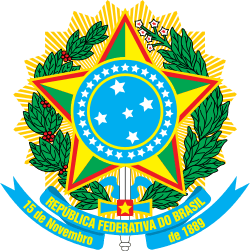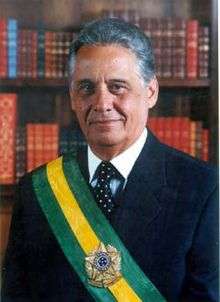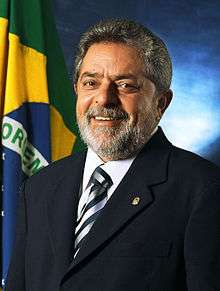Brazilian general election, 1994
| | |||||||||||||||||||||||||||||||||||||||
| |||||||||||||||||||||||||||||||||||||||
| |||||||||||||||||||||||||||||||||||||||
|
| |||||||||||||||||||||||||||||||||||||||
| Presidential election results map after voting: Blue denotes states won by Cardoso Red denotes states won by Lula | |||||||||||||||||||||||||||||||||||||||
| |||||||||||||||||||||||||||||||||||||||
 |
| This article is part of a series on the politics and government of Brazil |
|
| Foreign relations |
General elections were held in Brazil on 3 October 1994.[1] The presidential elections were won by Fernando Henrique Cardoso of the Brazilian Social Democracy Party (and also supported by the Liberal Front Party and the Brazilian Labour Party),[2] who received 54.3% of the vote.[3] Cardoso won the election by a margin of 27.3%, the largest in Brazilian history to date, and the first of his two landslide victories. The Brazilian Democratic Movement Party remained the largest party in the Chamber of Deputies and the Senate.
Results
President
| Candidate | Party | Votes | % |
|---|---|---|---|
| Fernando Henrique Cardoso | Brazilian Social Democracy Party | 34,362,726 | 54.3 |
| Luiz Inácio Lula da Silva | Workers' Party | 17,116,579 | 27.0 |
| Enéas Carneiro | Party of the Reconstruction of the National Order | 4,671,474 | 7.4 |
| Orestes Quércia | Brazilian Democratic Movement Party | 2,773,497 | 4.4 |
| Leonel Brizola | Democratic Labour Party | 2,015,843 | 3.2 |
| Espiridião Amin | Reform Progressive Party | 1,739,780 | 2.7 |
| Carlos Antônio Gomes | National Reconstruction Party | 387,815 | 0.6 |
| Hernani Fortuna | Social Christian Party | 238,257 | 0.4 |
| Invalid/blank votes | 14,638,118 | – | |
| Total | 77,944,089 | 100 | |
| Registered voters/turnout | 94,743,043 | 82.3 | |
| Source: Nohlen | |||
Chamber of Deputies
References
- ↑ Nohlen, D (2005) Elections in the Americas: A data handbook, Volume II, p174 ISBN 978-0-19-928358-3
- ↑ Nohlen, p234
- ↑ Nohlen, p233
- ↑ In 1990: Democratic Social Party (8.9%, 42 seats) + Christian Democratic Party (3.0%, 22 seats)
- ↑ In 1990: Reform Labour Party (1.1%, 5 seats) + Social Labour Party (1.0%, 2 seats)
This article is issued from Wikipedia - version of the 11/27/2016. The text is available under the Creative Commons Attribution/Share Alike but additional terms may apply for the media files.



.svg.png)